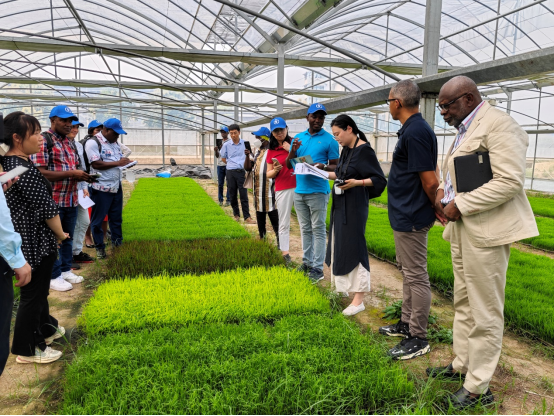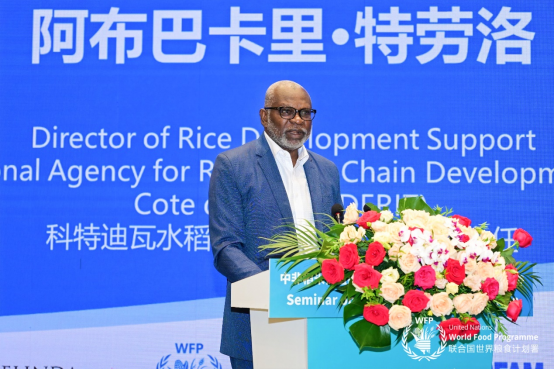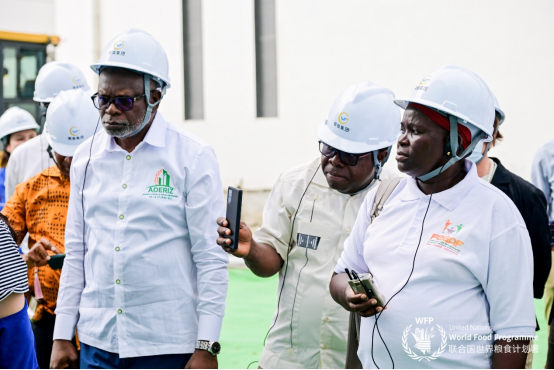
Members of an African delegation visit a rice seed research facility in the county of Funing, Yancheng, Jiangsu Province, on 16 June (Photo by Zhaoyu Zhang/WFP China Office)
Sia Evelyne Koudounon was amazed by how China handles rice-related operations during her visit to Jiangsu Province in east China in June. As head of a farmers’union of a village called Guegueckoce in Guinea, she was invited to China under an exchange programme forrice value chain.
“We saw a lot here, from rice production to processing, packaging and marketing. The system is good, impeccable,” she told ChinAfrica.
The trip was part of a workshop organised following the launch of the China-Africa Rice Value Chain Development Initiative in March 2021 by the World Food Programme (WFP) Centre of Excellence for Rural Transformation and Regional Centre of Excellence against Hunger and Malnutrition. It is a Global South-South Development Centre project aiming to facilitate South-South knowledge sharing, mutual learning, as well as technology and expertise transfer in advancing rice value chain development between African countries and China.
Acknowledging the role women have played in the rice value chain, female farmer representatives in Africa were invited to join the workshop. Koudounon was one of them, and the workshop was a great inspiration for her.
“At our level, we will not be able to do what we have seen here, but we will do it on a small scale in our different communities, with our cooperatives and with our unions,”she said.

Aboubakary Traore, director of Rice Development Support, National Agency for Rice Value Chain Development of Côte d’Ivoire, speaks at a seminar on China-Africa rice value chain in Wuxi, Jiangsu Province, on 20 June
Key food source
The initiative is a response to the need to improve food security in Africa, where malnutrition rates are still high. Nearly 40 percent of the world’s stunted children and about 30 percent of children affected by underweight, stunting and wasting globally live in Sub-Saharan Africa, according to Hameed Nuru, director of the WFP African Union Global Office and representative to the African Union and Economic Commission for Africa, while there are only two years left to achieve the Malabo Declaration goals and seven years to achieve the Sustainable Development Goal 2, which is about creating a world free of hunger by 2030.
The COVID-19 pandemic and Ukraine crisis have further shown the vulnerability of Africa’s food security. “Bread baskets for Africa must be established or reestablished, and rice must be a part of this future,” he said.
According to Nuru, as an indigenous grain species, rice has been grown in Africa for more than 3,000 years and has become the second-most important source of calorie in the continent. It is grown in 43 African countries and is an income source for up to 35 million farmers on the continent. Demand for rice is increasing due to changes in consumer preferences, and Africa now accounts for 32 percent of the world’s rice imports. “Rice is ubiquitous, and without it, we cannot achieve zero hunger in Africa,” he said.
Africa is facing various challenges along the rice value chain. For rice production, for example, improvement is required in technology, seeds, fertiliser, as well as pest and disease control. Climate change and temperature variations are also influencing factors. Improvements are also need in post-harvest management and rice processing and value addition.
The WFP is committed to the development of the rice value chain in Africa by supporting rice value-addition efforts through partnership, dissemination of research findings and technologies to communities, and strengthening smallholder farmers’ role in rice production, among other means. It also seeks to involve more youth and women in the efforts. Transferring knowledge on rice from China, the world’s largest rice producer, has been a key measure.
Chinese expertise

Members of an African delegation visit a grain storage facility in Wuxi, Jiangsu Province, on 20 June
Agnes Kalibata, president of the Alliance for a Green Revolution in Africa, emphasised the need for Africa to learn from Asian countries, especially China, how to reduce post-production loss of rice. According to her, this loss in Africa’s rice value chain stands at 20 to 40 percent.
Aboubakary Traore, director of the Rice Development Support Department at the National Agency for Rice Value Chain Development of Côte d’Ivoire, found after a visit to Sheyang, Jiangsu Province, in June that there were more areas along the rice value chain where the two countries could cooperate.
“Chinese experts have assisted our African countries in the cultivation and plantation of seeds. But after this visit, I can see that we can actually carry out more in-depth cooperation in other fields,” he said.
Apart from the application of advanced technology and equipment, including big data, Traore mentioned irrigation for rice as an important area for future cooperation. “Most of our farmland does not have such a complete irrigation system and water conservancy system as in China. It can be said that it depends on rainfall,” he said.
He also found it inspiring how China has integrated smallholder farmers to improve rice production capacity. According to him, agriculture in Côte d’Ivoire is mainly based on small-scale farming, and about 80 percent of the players in the sector are smallholder farmers. “We hope to learn from China how to enable these smallholder farmers in our country to better share our economic support and technical support to jointly improve our country’s rice production capacity,” he said.
As one of the measures to facilitate knowledge transfer, the WFP launched the South-South Cooperation Knowledge Sharing Platform, an online platform where information on a variety of subjects, including rice, is provided.
In the opinion of Nuru, such knowledge transfer is more valuable than help in the form of materials. “Africa does not want handouts. We want opportunities and expertise to help us succeed on our own. There is no greater gift and friendship than the ability to enable one to feed himself and never be hungry. We look towards China for this gift because you know how we feel - you have been there in the past and today you are in a position to support us,” he said.

